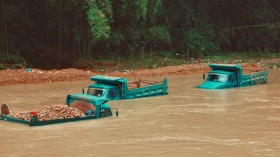Seven commissioners from the Florida Fish and Wildlife Conservation Commission (FWC) have voted late Wednesday to postpone bear hunts in Florida this year.
The vote, which turned up 4-3, is an attempt to gather more information on the bear hunts following a controversial hunt in 2015 that killed 304 bears in just two days. The kills included 36 mother bears nursing cubs at the time.
Bear hunting had been illegal since 1994 and the species had even been considered for the federal endangered species list. However, the bears' population have increased to more than 4,000 in 2015. "Nuisance bears" reportedly caused unwanted potential human interactions, attacks on Floridians' pets, and bears raiding trash cans in search for food. As a result, the FWC scheduled the seven-day hunt last year which killed over 300 bears, citing a bear management plan as reason for the hunt.
Nevertheless, as noted by Tampa Bay Times, instead of looking at the bears as nuisance, we should consider our garbage as "all-too-available" for the bears. Human encroachment in wildlife habitat in the state could also be looked at as a "nuisance" itself.
This thought is echoed by Humane Society of the United States' southern region director Laura Bevan, who told the Christian Science Monitor in April:
"Problem bears in human areas are already dealt with harshly by officials. The October bear hunt targeted bears in the woods, not the problem bears."
Postponing the bear hunts in 2016 is therefore a good solution to the problem as it would provide stakeholders, local communities and the public more time to develop hunting's important role in the comprehensive bear management program of Florida. According to the Pensacola News Journal, it would also allow the FWC to continue working with local communities to come up with other original ways to reduce conflicts between humans and bears.
Bear-proof trash cans is also being considered a possible solution now.
Director of the Humane Society of the United States' Wildlife Abuse Campaign, Tracy Coppola also told the Monitor that despite trash collectors' difficulty in using the trash cans, they are already considered a norm in several states, and that without the cans "we've basically invited the bears to dinner."
The surprising decision by the FWC is good news to both bears and people in the state. It provides more leeway for talking things out and providing better solutions.
© 2024 NatureWorldNews.com All rights reserved. Do not reproduce without permission.




![Great White Sharks Observed for the First Time Changing Their Behavior in Different Marine Environments [Study]](https://1471793142.rsc.cdn77.org/data/thumbs/full/70251/280/157/50/40/great-white-sharks-observed-for-the-first-time-changing-their-behavior-in-different-marine-environments-study.jpg)
